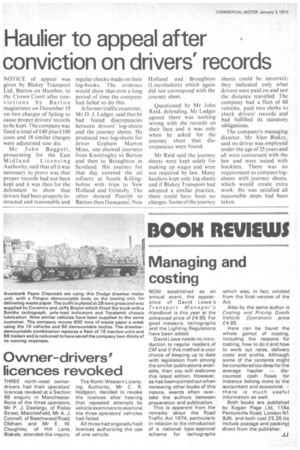Haulier to appeal after conviction on drivers' records
Page 16

If you've noticed an error in this article please click here to report it so we can fix it.
NOTICE of appeal was given by Blakey Transport Ltd, Barton on Humber, to the Crown Court after convictions by Barton magistrates on December 19 on two charges of failing to cause proper drivers' records to be kept. The company was fined a total of £40 plus I.:100 costs and 18 similar charges were adjourned sine die.
Mr John Baggott, prosecuting for the East Midland Licensing Authority, said that all it was necessary to prove was that proper records had not been kept and it was then for the defendant to show that drivers had been properly instructed and reasonable and regular checks made on their Jog-books. The evidence would show that over a long period of time the company had failed to do this.
A former traffic examiner, Mr D. J. Ledger, said that he had found discrepancies between drivers' log-sheets and the journey sheets. He produced two log-sheets for driver Graham Martyn Moss. one showed journeys from Knottingley to Barton and then to Broughton in Scotland. His journey for that day covered the oil refinery at South Killingholme with trips to New Holland and Grimsby. The other showed Pen rith to Barton then Doncaster, New
Holland and Broughton (Lincolnshire) which again did not correspond with the journey sheet.
Questioned by Mr John Reid, defending, Mr Ledger agreed there was nothing wrong with the records on their face and it was only when he asked for the Journey sheet that discrepancies were found.
Mr Reid said the journey sheets were kept solely for making up wages and were not required by law. Many hauliers kept only log sheets and if Blakey Transport had adopted a similar practice, there could have been no charges. Some of the j ourney sheets could be incorrect; they indicated only what drivers were paid on and not the distance travelled. The company had a fleet of 60 vehicles, paid two clerks to check drivers' records and had fulfilled its statutory obligations.
The company's managing director. Mr Alan Blakey, said no driver was employed under the age of 25 years and all were conversant with the law and were issued with booklets. There was no requirement to compare logsheets with journey sheets, which would create extra work. He was satisfied all reasonable steps had been taken.












































































